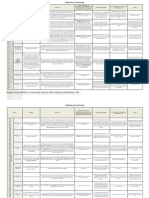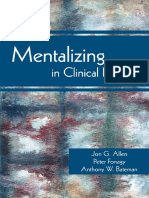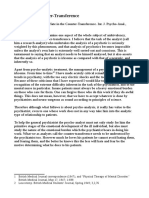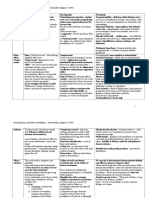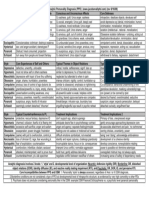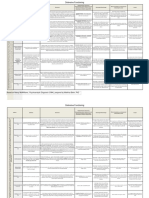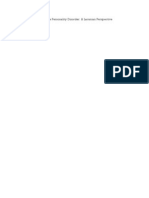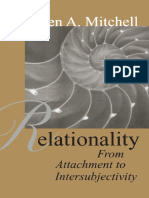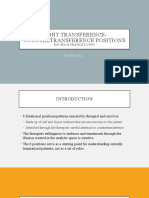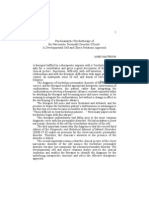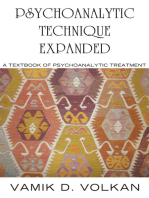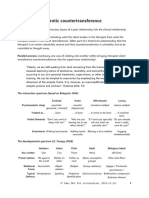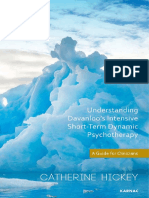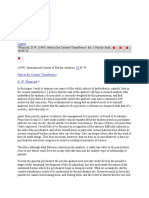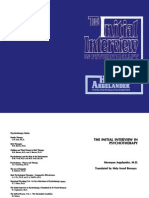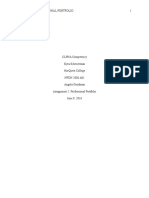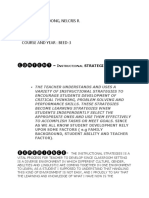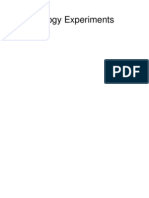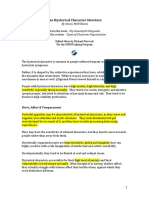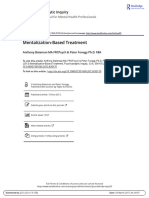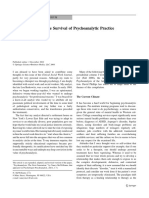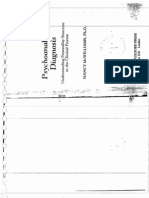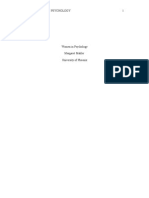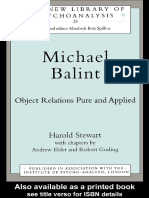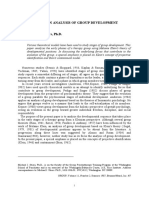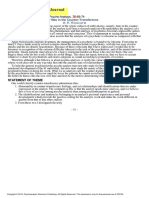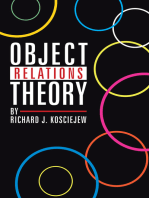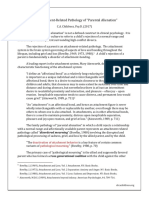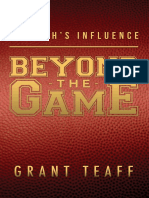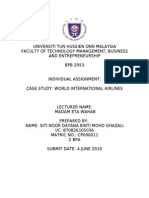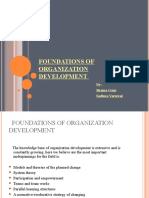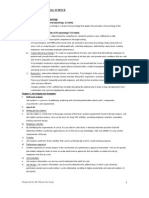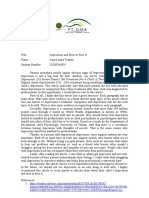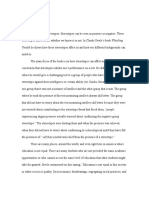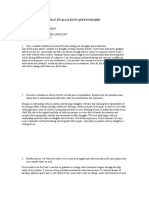McWilliams Ch.13 Obsessive Compulsive Personalities - Summary
McWilliams Ch.13 Obsessive Compulsive Personalities - Summary
Uploaded by
ar_poleCopyright:
Available Formats
McWilliams Ch.13 Obsessive Compulsive Personalities - Summary
McWilliams Ch.13 Obsessive Compulsive Personalities - Summary
Uploaded by
ar_poleOriginal Description:
Copyright
Available Formats
Share this document
Did you find this document useful?
Is this content inappropriate?
Copyright:
Available Formats
McWilliams Ch.13 Obsessive Compulsive Personalities - Summary
McWilliams Ch.13 Obsessive Compulsive Personalities - Summary
Uploaded by
ar_poleCopyright:
Available Formats
1
Ch. 13 Obsessive and Compulsive Personalities
Obsessions = persistent, unwanted thoughts Compulsions = persistent, unwanted actions Where both thinking and doing propel someone psychologically, in marked disproportion to feeling, sensing, intuiting, listening, playing, daydreaming, enjoying the creative arts, and other modes that are less rationally driven or instrumental, we may infer an obsessive-compulsive personality structure. There are people who are strongly invested in thinking yet who are relatively indifferent to doing, and vice versa. Obsessive and compulsive symptoms are conceptually & sometimes clinically separate. Obsessive & compulsive trends often coexist in a person, & analytic explorations of their respective origins have revealed similar dynamics. Not all obsessive and compulsive individuals suffer recurrent intrusive thoughts or engage in irresistible actions. We refer to them as obsessive-compulsive because their coping style involves the same defenses that are implicated in obsessive and compulsive symptoms. In OCD (in older language, neuroses), repetitive thoughts and irresistible actions are ego alien, disturbing the person who has them. In obsessive-compulsive character structure, they are ego syntonic. Most behavior we tend to see as pathological is by definition compulsive (repeated actions proven futile or harmful). Only when undoing is prominent is an action compulsive in the narrower sense of an obsessive-compulsive dynamism or a compulsive personality organization.
DRIVE, AFFECT, AND TEMPERAMENT IN OBSESSION AND COMPULSION Freud believed that people who develop obsessive-compulsive disorders were rectally hypersensitive in infancy, physiologically and constitutionally; emphasis on fixation at the anal phase of development (roughly 18 months to 3 years). o Features of OC personalities cleanliness, stubbornness, concerns with punctuality, tendencies towards withholding are salient issues during toilet-training o Found anal imagery in language, dreams, memories, and fantasies of OC patients o OC patients had been pushed toward bowel control prematurely or harshly or in context of parental overinvolvement Freud reasoned that toilet training usually constitutes the first situation in which the child must renounce what is natural for what is socially acceptable. The responsible adult and the child who is being trained too early or too strictly or in an atmosphere of lurid parental overconcern enter a power struggle that the child is doomed to lose. The experience of being controlled, judged, and required to perform on schedule creates angry feelings and aggressive fantasies, often about defecation, that the child eventually feels as a bad, sadistic, dirty, shameful part of the self. The need to feel in control, punctual, clean, and reasonable, rather than out of control, erratic, messy, and caught up in emotions like anger and shame, becomes important to the maintenance of identify and self-esteem. Basic affective conflict: rage (at being controlled) vs. fear (of being condemned or punished)
2 Affect is unformulated, muted, suppressed, unavailable, or rationalized and moralized Use words to conceal feelings, not to express them, except o Rage if seen as reasonable and justified; therapists frequently feel presence of normal reactive anger but patients typically deny it o Shame high expectations for themselves, project onto therapist, then feel embarrassed to be seen falling short of their own standards for proper thoughts and deeds; generally conscious to the patients.
DEFENSIVE AND ADAPTIVE PROCESSES IN OBSESSION AND COMPULSION Obsessive people predominantly use isolation of affect; may also use displacement especially anger to a legitimate target Compulsive people mainly use undoing Higher functioning obsessional people prefer more mature versions: rationalization, moralization, compartmentalization, intellectualization OC people rely heavily on reaction formation
Cognitive Defenses against Drives, Affects, and Wishes OC individuals idealize cognitive and mentation, consign most feelings to a devalued realm associated with childishness, weakness, loss of control, disorganization, and dirt great disadvantage in situations where emotions, physical sensations, and fantasy have a powerful and legitimate role. Obsessive people are capable of loving attachments but not able to express tenderer selves without anxiety and shame turn emotionally toned interactions into oppressively cognitive ones (second-person locutions, rational analysis & problem solving) Obsessional people in borderlines and psychotic ranges may use isolation so relentlessly that they look schizoid; more disturbed obsessional people border on paranoia
Behavioral Defenses against Drives, Affects, and Wishes Compulsivity vs. Impulsivity o A particular action is repeated over and over in a stylized and sometimes escalating way o Not centrally driven by need to master unprocessed past experiences by recreating them (?) Compulsive activities maybe harmful or beneficial; what makes them compulsive is not their destructiveness but their driveness Compulsive actions often have the unconscious meaning of undoing a crime, which in most instances exist mainly in fantasy Fantasies of omnipotent control (?) o In prerational cognition (primary process thought), the self is the center of the world, and what happens to oneself is the result of ones own activity; think at some level they can control the uncontrollable if only they do the right thing
Reaction Formation
3 Freud believed that the conscientiousness, fastidiousness, frugality, and diligence of OC people were reaction formations against wishes to be irresponsible, messy, profligate, and rebellious. Defense against tolerating ambivalence between cooperation and rebellion, initiative and sloth, cleanliness and slovenliness, order and disorder etc. Maybe struggling against more powerful temptations toward self-indulgence than most of us
RELATIONAL PATTERNS IN OBSESSIVE AND COMPULSIVE PSYCHOLOGIES One route: Parental figures who set high standards of behavior and expect early conformity to them; strict and consistent in rewarding good behavior and punishing malfeasance tends to produce OC people who expect a lot of themselves & good track record for realizing their goals Unreasonably exacting or prematurely demanding or condemnatory of accompanying feelings, thoughts, and fantasies childrens OC adaptations can be more problematic From an object relations perspective, what is notable about OC people is the centrality of issues of control in their families of origin Meares (2001): overprotective parents get in the way of a young childs taking the small risks necessary to develop sense of boundary of self, and accounts for the omnipotent, magical thinking found in OC people in terms of lack of this boundary (?) Two versions of OC personality appear to arise out of different parenting practices: o Old-fashioned, Freudian obsessive-compulsive Guilt-dominated psychology More introjective, or self-definition oriented Control may be expressed in moralized, guilt-inducing terms E.g. Im disappointed that you were not responsible enough to o More comtemporary version More shame based, focused on looking perfect to others rather than responding to ones morally perfectionistic internal gyroscope Less guilt-prone OC people Families emphasize control foster OC patterns through shaming rather than guilt induction E.g. what will people think of you if youre overweight? Another route: Some feel so bereft of clear family standards, so unsupervised and casually ignored by adults around them, that in order to push themselves to grow up they hold themselves to idealized criteria of behavior and feeling (abstract and not modeled by people known personally) that they derive from the larger culture. Patients with the harshest superegos found to be most laxly parented concluded that having to model oneself after a parental image that one invents oneself, especially if one has an intense, aggressive temperament that is projected into that image, can create OC dynamics.
4 THE OBSESSIVE-COMPULSIVE SELF Introjectively oriented OC people Equate righteous behavior with keeping aggressive, lustful, needy parts of self under strict rein Seriously religious, hard-working, selfcritical, dependable Self-esteem from meeting demands of internalized parental figures Worry a lot esp when making a choice Introjective depressions* Introjective obsessive patients may have private vanity about stringency of their demands on themselves; value self-control over most other virtues diminish capacities for sexuality, play humor spontaneity etc. Anaclitically oriented OC people Worry a lot too, but focus is more external perfect decision is one that no witness can criticize Anaclitic depressive reactions (see Ch.11)*
Obsessive People o Often postpone and procrastinate until external circumstances determine direction o doubting mania in effort to keep all options open, so that they can maintain (fantasized) control over all possible outcomes end up no option o Tend to postpone decision making until they can see what the perfect (i.e. guilt and uncertainty free) decision would be o Often seduce therapist into offering an opinion & immediately responds with counterarguments o yes, but stance partly an effort to avoid guilt that inevitably accompanies action Compulsive People o Instead of postpone and procrastinate, they speed ahead o Also have similar problem with guilt/shame & autonomy, solve by jumping into action before considering alternatives o For them, certain situations have demand characteristics requiring certain behaviors, not necessarily foolish or self-destructive (e.g. compulsively helpful) o (?) The compulsive persons rush to action has the same relationship to autonomy as the obsessive persons avoidance of action. Instrumental thinking and expressive feeling are both circumvented lest the person notice that he or she is actually making a choice. Choice involves responsibility for ones actions, and responsibility involves tolerance of normal levels of both guilt and shame OC people so saturated with irrational guilt &/or shame they cant absorb any more of these feelings *O people support self-esteem by thinking, C people by doing if not they become depressed In an effort to bypass the overall import of any decision or perception, the appreciation of which might arouse guilt, they become fixed on specific details or implications (What if?)
5 TRANSFERNECE AND COUNTERTRANSFERENCE WITH OBSESSIVE AND COMPULSIVE PATIENTS Tend to be good patients serious, conscientious, honest, motivated, and hard-working Typical for obsessional clients to experience therapist as a devoted but demanding & judgmental parent, and be consciously compliant but unconsciously oppositional; subtly or overtly argumentative, controlling, critical, and resentful about parting with money Wait impatiently for therapist to speak and then interrupt before a sentence is completed Countertransference o Often includes an annoyed impatience o Mystified by obsessional persons shame about most emotions and resistance to admitting them o Atmosphere of veiled criticism that OC people emits can be discouraging and undermining o Easily feel bored or distanced by clients unremitting intellectualization o Unconscious devaluation of more guilt-ridden OC patients, something touching about their efforts to be good in such childlike ways as cooperating and deferring o Doubt whether anything is being accomplished in therapy are typical
THERAPEUTIC IMPLICATIONS OF THE DIAGNOSIS OF OBSESSIVE OR COMPULSIVE PERSONALITY 1st rule of practice is ordinary kindness Appreciation for, and interpretation of, their vulnerability to shame is essential Refusal to advise them, hurry them, and criticize them for the effects of their isolation, undoing, and reaction formation will foster more movement than confronting measures Countertransference-driven power struggles are common Avoid therapeutic equivalent of becoming demanding, controlling parent by keep relating warmly Refusing to control should be distinguished from attitudes that will be felt as emotional disengagement Exception to general rule of refusing to advise or control concerns people whose compulsions are outright dangerous; if accept compulsively self-harming people into tx unconditionally, therapist may unwittingly contribute to their fantasies that therapy will operate magically, without their having at some point to exert self-control, especially compulsion involves substance abuse Many compulsions are not responsive to treatment until they encounter sharp negative consequences 2nd important feature of good work is avoidance of intellectualization interpretations that address cognitive level of understanding, before affective responses have been disinhibited, will be counterproductive Instead of asking but how do you feel? all the time, one way to bring more affective dimension into the work is through imagery, symbolism, and artistic communication 3rd component of good tx willingness to help them express their anger and criticism about therapy and therapist
6 Needs not only help patients find and name their affects but also to encourage them to enjoy them What good will it do to feel that? answer is that harm is being done in not feeling it Therapists quiet dedication to emotional honesty, and patients growing experience that he will not be judged or controlled, will move the work forward CBT and SSRI less effective with ego-syntonic ruminations and compulsions
DIFFERENTIAL DIAGNOSIS Obsessive structure hard to distinguish from o schizoid psychology, especially lower-functioning end of developmental continuum o narcissistic personalities with obsessive defenses o organic brain syndromes
Obsessive vs. Narcissistic Personality Therapist should look for unconscious anger, omnipotent fantasies, and guilt rather than subjective emptiness and fragile self-esteem OC people have strong center of gravity psychologically; they are judgmental and self-critical Mirroring are received by OC clients as corrupting, in that patient views the therapist as implicitly condoning aspects of self that patient sees as indefensible begin doubt the moral credentials of therapist
Obsessive vs. Schizoid Personality Schizoid: conscious of intense inner feelings and vivid fantasies even they withdraw from outer world communicate to clients its safe to express intense inner experience Withdrawn obsessional person: uses isolation to completely he may be subjectively blank or wooden in appearance communicate to clients it must be terrible to feel so cold and dead inside
Obsessive-Compulsive vs. Organic Conditions Dynamically informed questioning will reveal that isolation of affect and undoing are not involved Good history taking, ask about possible fetal alcohol syndrome or maternal addiction during pregnancy, complications at birth, illnesses with high fever (meningitis, encephalitis), head injury etc. Confirmed by neurological exam
You might also like
- McWilliams' Defensive Functioning - Table by BeierDocument3 pagesMcWilliams' Defensive Functioning - Table by BeierMatthiasBeier92% (12)
- Mentalizing in Clinical PracticeDocument424 pagesMentalizing in Clinical PracticeJosé Di Sipio96% (26)
- Little - Psychotic Anxieties and Containment, A Personal Record of An Analysis With WinnicottDocument14 pagesLittle - Psychotic Anxieties and Containment, A Personal Record of An Analysis With WinnicottJulián Alberto Muñoz Figueroa100% (3)
- Co-Creating Safety: Healing the Fragile PatientFrom EverandCo-Creating Safety: Healing the Fragile PatientRating: 5 out of 5 stars5/5 (2)
- Case FormulationDocument17 pagesCase Formulationksenijap100% (4)
- 1949 Winnicott Hate in The CountertransferenceDocument10 pages1949 Winnicott Hate in The CountertransferenceKevin McInnes100% (1)
- Meira Likierman - Melanie Klein Her Work in ContextDocument209 pagesMeira Likierman - Melanie Klein Her Work in ContextJovana Strugar100% (16)
- Personality Type PDMDocument25 pagesPersonality Type PDMEdithGanciarov86% (7)
- The Syndrome of Identity Diffusion 1984Document5 pagesThe Syndrome of Identity Diffusion 1984ruth sendie EdmondNo ratings yet
- Co Creating Change Jon FredericksonDocument663 pagesCo Creating Change Jon Fredericksonnital00113% (8)
- The Analytic Attitude Roy SchafferDocument34 pagesThe Analytic Attitude Roy Schaffermarlop50% (4)
- Psychoanalytic Diagnoses Chart SummaryDocument1 pagePsychoanalytic Diagnoses Chart SummaryAdriana Bogdanovska Toskic100% (2)
- Winnicott The Use of An ObjectDocument7 pagesWinnicott The Use of An ObjectCullynNo ratings yet
- Melanie Klein and Object Relations TheoryDocument15 pagesMelanie Klein and Object Relations TheoryAgrammmm100% (1)
- McWilliams' Defensive Functioning - Table by BeierDocument3 pagesMcWilliams' Defensive Functioning - Table by BeierCLD100% (1)
- Borderline Personality Disorder - A Lacanian Perspective 6-30-08Document217 pagesBorderline Personality Disorder - A Lacanian Perspective 6-30-08Kaia Rubi83% (6)
- 2000 Mitchell RELATIONALITY From Attachment To Intersubjectivity PDFDocument192 pages2000 Mitchell RELATIONALITY From Attachment To Intersubjectivity PDFPsiquiatría CESAME100% (7)
- Eight Transference-Countertransference PositionsDocument21 pagesEight Transference-Countertransference PositionsRob100% (1)
- MASTERSON-Psychoanalytic Psychotherapy of Narcissistic Personality DisorderDocument22 pagesMASTERSON-Psychoanalytic Psychotherapy of Narcissistic Personality Disorderzrinka321100% (4)
- Object Relations Theory and Self Psychology in SocFrom EverandObject Relations Theory and Self Psychology in SocRating: 4 out of 5 stars4/5 (4)
- Psychoanalytic Technique Expanded: A Textbook on Psychoanalytic TreatmentFrom EverandPsychoanalytic Technique Expanded: A Textbook on Psychoanalytic TreatmentRating: 4 out of 5 stars4/5 (1)
- The Impact of My Own Psychotherapy On My Work As A Therapist (Mcwilliams2013) PDFDocument6 pagesThe Impact of My Own Psychotherapy On My Work As A Therapist (Mcwilliams2013) PDFAnastasiya PlohihNo ratings yet
- Mothering and Fathering Processes in The Psychoanalytic Art (Nancy McWilliams)Document22 pagesMothering and Fathering Processes in The Psychoanalytic Art (Nancy McWilliams)Anastasiya PlohihNo ratings yet
- Erotic CountertransferenceDocument3 pagesErotic CountertransferenceVictor Gan100% (2)
- Kernberg, Handbook of Dynamic Psychotherapy For Higher Level Personality PathologyDocument275 pagesKernberg, Handbook of Dynamic Psychotherapy For Higher Level Personality PathologyAlejandro Enriquez Lóyzaga100% (5)
- Some Thoughts About Schizoid Dynamics Nancy McwilliamsDocument31 pagesSome Thoughts About Schizoid Dynamics Nancy Mcwilliams0x2362100% (1)
- 5 - Klein - Object Relations TheoryDocument4 pages5 - Klein - Object Relations Theorystephanie100% (1)
- Understanding Davanloo's Intensive Short-Term Dynamic PsychotherapyDocument295 pagesUnderstanding Davanloo's Intensive Short-Term Dynamic PsychotherapyAlbertoPita100% (4)
- Steiner, J. (1994) - Patient-Centered and Analyst-Centered Interpretations. Some Implications of Containment and CountertransferenceDocument9 pagesSteiner, J. (1994) - Patient-Centered and Analyst-Centered Interpretations. Some Implications of Containment and CountertransferenceJulián Alberto Muñoz FigueroaNo ratings yet
- Winnicott Hate in CountertransferenceDocument10 pagesWinnicott Hate in CountertransferenceheinrothNo ratings yet
- The Initial Interview in Psychotherapy - Hermann ArgelanderDocument75 pagesThe Initial Interview in Psychotherapy - Hermann ArgelanderMapuche Azteca100% (1)
- NFDN 2006 CompetencyDocument4 pagesNFDN 2006 Competencyapi-317589937No ratings yet
- Interview Form - Catering ManagerDocument5 pagesInterview Form - Catering ManagerMung'atia AquiniusNo ratings yet
- Cera Format ReflectionDocument13 pagesCera Format ReflectionNelcris Tacandong100% (4)
- Experiments in PsychologyDocument152 pagesExperiments in Psychologyrbvummadi7342No ratings yet
- INTJDocument7 pagesINTJWildlingNo ratings yet
- Introduction of RetentionDocument4 pagesIntroduction of RetentionAmeySalaskar100% (1)
- The Hysterical Character Structure McWilliamsDocument10 pagesThe Hysterical Character Structure McWilliamsClaudia Zavala100% (3)
- McWilliams - CH 10 ParanoidDocument6 pagesMcWilliams - CH 10 Paranoidredpsych103100% (3)
- Object Relations TheoryDocument2 pagesObject Relations TheoryMari269e67% (3)
- Mentalization Based TreatmentDocument20 pagesMentalization Based TreatmentoananisioiNo ratings yet
- Nancy Mcwilliams Shared Understanding PDFDocument10 pagesNancy Mcwilliams Shared Understanding PDFJESUS AYLLON33% (3)
- Ogden The Fear of BreakdownDocument19 pagesOgden The Fear of BreakdownAdeleida Bingham100% (3)
- Some Thoughts On The Survival of Psychoanalytic Practice (Nancy McWilliams)Document3 pagesSome Thoughts On The Survival of Psychoanalytic Practice (Nancy McWilliams)Anastasiya Plohih100% (1)
- Gabbard Patients Who Hate PDFDocument12 pagesGabbard Patients Who Hate PDFBakos BenceNo ratings yet
- Psychodynamic Diagnostic ManualDocument6 pagesPsychodynamic Diagnostic Manualas9as9as9as9No ratings yet
- The Personality Syndromes: Disorders: Multi-Theoretical Viewpoints. Oxford: Oxford University PressDocument30 pagesThe Personality Syndromes: Disorders: Multi-Theoretical Viewpoints. Oxford: Oxford University PressDavidNo ratings yet
- Kohut H. The Disorders of The Self and Their Treatment Int.J.psychoa. Vol.59p.4131978Document13 pagesKohut H. The Disorders of The Self and Their Treatment Int.J.psychoa. Vol.59p.4131978ssanagav0% (1)
- Kernberg1994 Love in The Analytic SettingDocument21 pagesKernberg1994 Love in The Analytic SettingDaniela CantúNo ratings yet
- The Assessment of MentalizationDocument68 pagesThe Assessment of MentalizationPaul Scallan100% (5)
- Countertransference TrainingDocument10 pagesCountertransference TrainingShraddha SharmaNo ratings yet
- Primary and Secondary Defensive ProcessesDocument27 pagesPrimary and Secondary Defensive ProcessesAlex Nomar100% (2)
- McWilliams (2009)Document4 pagesMcWilliams (2009)Stacy Lanier100% (1)
- Kernberg and Modern Object Relations Theory PDFDocument82 pagesKernberg and Modern Object Relations Theory PDFabraham lopez100% (1)
- Women in Psychology - Margaret MahlerDocument7 pagesWomen in Psychology - Margaret MahlerNadia ShinkewiczNo ratings yet
- Notes On Some Schizoid MechanismsDocument20 pagesNotes On Some Schizoid MechanismsJade Xiao100% (1)
- Andrew Elder - Robert Gosling - Harold Stewart - Michael Balint - Object Relations Pure and Applied PDFDocument148 pagesAndrew Elder - Robert Gosling - Harold Stewart - Michael Balint - Object Relations Pure and Applied PDFCorrado Rosen100% (3)
- Approaching Hysteria: Disease and Its Interpretations.Document4 pagesApproaching Hysteria: Disease and Its Interpretations.Caroline RynkevichNo ratings yet
- A Kleinian Analysis of Group DevelopmentDocument11 pagesA Kleinian Analysis of Group DevelopmentOrbital NostromoNo ratings yet
- Winnicott Counter TransferenceDocument7 pagesWinnicott Counter TransferenceGabriel LevyNo ratings yet
- The Evolution of Winnicotts ThinkingDocument369 pagesThe Evolution of Winnicotts ThinkingJuan Pedro GareseNo ratings yet
- Ending Therapy - Terry KupersDocument222 pagesEnding Therapy - Terry KupersIleana Balaci100% (2)
- The Handbook of Mentalization-Based TreatmentFrom EverandThe Handbook of Mentalization-Based TreatmentRating: 4 out of 5 stars4/5 (1)
- Pain Self Efficacy Questionnaire 1 9Document1 pagePain Self Efficacy Questionnaire 1 9ifalampung05No ratings yet
- How To Stop ProcrastinatingDocument92 pagesHow To Stop Procrastinatingcc.nwankwoNo ratings yet
- Description of Disordered Mourning PathologyDocument4 pagesDescription of Disordered Mourning PathologyAttachment Pathology DynamicsNo ratings yet
- Beyond The Game Unabridged PDFDocument273 pagesBeyond The Game Unabridged PDFJUSTME152No ratings yet
- The 10 Best Books For Genuine Self Improvement Guide Nick WignallDocument31 pagesThe 10 Best Books For Genuine Self Improvement Guide Nick WignallNaeem Shaikh100% (1)
- OB Case StudyDocument9 pagesOB Case StudyDayana Mohd Ghazali100% (2)
- Foundations of Organization Development: By:-Shama Gaur Sadhna VarnwalDocument21 pagesFoundations of Organization Development: By:-Shama Gaur Sadhna VarnwalShama GaurNo ratings yet
- NotesDocument7 pagesNotes天涯樂No ratings yet
- Low InvolvementDocument26 pagesLow InvolvementVivek MishraNo ratings yet
- Argumentative EssayDocument2 pagesArgumentative EssayzNo ratings yet
- MPC 002 Life Span Psychology SyllabusDocument10 pagesMPC 002 Life Span Psychology Syllabus03sri03No ratings yet
- Does Smoking Efftect Intellegence RevisedDocument22 pagesDoes Smoking Efftect Intellegence Revisedtalalnugali25No ratings yet
- Chapter 2Document6 pagesChapter 2Hira Arshad100% (1)
- Community As Treatment The Therapeutic Community Model in The Era of The Opioid Crisis 7F6rDocument5 pagesCommunity As Treatment The Therapeutic Community Model in The Era of The Opioid Crisis 7F6rSci TechnolNo ratings yet
- FECS-Scale-final FAMILY EXPERIENCES IN CHILDHOODDocument11 pagesFECS-Scale-final FAMILY EXPERIENCES IN CHILDHOODNuria Fernández de MarticorenaNo ratings yet
- Whistling Vivaldi AnalysisDocument2 pagesWhistling Vivaldi AnalysisAlexNo ratings yet
- Formative Assessment EssayDocument4 pagesFormative Assessment Essayapi-293532268No ratings yet
- FTC 2 Chapter 1Document13 pagesFTC 2 Chapter 1Vilma BalazonNo ratings yet
- Why Are Goals ImportantDocument1 pageWhy Are Goals ImportantAnoosha MansoorNo ratings yet
- Janrey 11Document4 pagesJanrey 11Matt BonNo ratings yet
- The Impact of Transformational Leadership On StudDocument1 pageThe Impact of Transformational Leadership On StudSantiago BuladacoNo ratings yet
- Anxiety, Perceived Stress and CopingDocument9 pagesAnxiety, Perceived Stress and CopingplenosusNo ratings yet
- A2 Pe Coursework WeaknessesDocument5 pagesA2 Pe Coursework Weaknessespenebef0kyh3100% (2)
- Freedom MeterDocument2 pagesFreedom Metermariellebecera695No ratings yet
